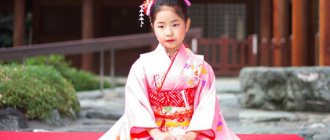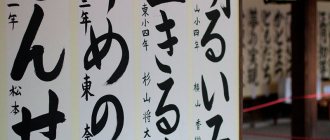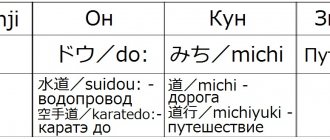| Nationality: | Japanese names |
| Floor: | Female names |
| Meaning: | useful, superior child |
| Name number: | 6 |
| Zodiac sign: | Leo ♌ Taurus ♉ Gemini ♊ Pisces ♓ |
| Talisman stones: | Rock Crystal, Obsidian, Malachite, Jade |
| Lucky numbers: | 5, 6, 14, 23, 32, 41, 50 |
| Lucky months: | January, March, April, June, August, November |
| Colors: | Orange, Yellow, Green |
People named Yuko are endowed with practicality, an increased desire for justice, decency and honesty. Such people have a very strong character, while they are very reliable, active, and will not protest against injustice, conflicts and troubles. Yuko is distinguished by her ability not only to save, but also to spend money. People like Yuko will not throw around empty promises or have their head in the clouds - it is thanks to their character that they often find a down-to-earth, practical and moderately demanding partner with whom they strive to live happily throughout their lives.
pros
- Developed logic, the ability to think practically and soberly, and demonstrate strength of character;
- Real assessment of one’s own and others’ abilities, the ability to feel and see money, use material wealth;
- Increased desire for fairness, honesty and integrity.
Minuses
- Increased demands on others and insufficient psychological flexibility;
- Excessive practicality can easily develop into greed, tediousness, and pickiness over trifles;
- Such people may exaggerate the shortcomings of others;
- In some cases, they can be very envious.
Character of the owner of the name Yuko
People named Yuko can easily grab stars from the sky and receive gifts from fate just like that, without much effort. Everything may work out well for them from the very beginning of their journey, so such people can be lucky, even if they find themselves in unpleasant situations, difficulties and conflicts, and quite easily.
Such people are focused on construction, work, activities that are related to work, which help them gain support in life. Such people easily achieve success, but in some cases it is difficult for them to overcome the craving for unreasonable risk and extravagance.
Forms and cases, declension of the name Yuki
Different names have different rules for forming forms and cases. And if everything is familiar and understandable with Russian names, then foreign names often have non-standard declination patterns. All cases and declension forms of the name Yuki are listed in the table below in the text.
| Cases and forms of the name | |
| Nominative | Yuki |
| Genitive | Yuki |
| Dative | Yuki |
| Accusative | Yuki |
| Instrumental | Yuki |
| Prepositional | about Yuki |
Successful professions for the name Yuko
These people are best suited for professions related to construction, everyday life, and the material side of life. Such people may not feel comfortable enough in activities with strict time frames; it is best for them to choose activities that are related to creativity, construction, the manifestation of writing abilities, eloquence, and singing. Such people can achieve success in business and in power, but this does not bring them much success in the future and they will still have to change their profession.
Numerology – number of the name Yuki
Typically, numerological analysis should be supported by knowledge of important dates in a person’s life. Analyzing character without knowing the exact numbers of a person is an impossible task. However, we have received certain statistics regarding Yuki's name in this area. This made it possible to get a general idea of personality type and basic character traits.
The number “0” has a very unusual history. It extends an equally unusual influence to Yuki’s fate. Throughout his life, this person seems to be the starting point for the cycle of events taking place around him. Many people blame Yuki for a great many strange ideas and actions, but his ideas often turn out to be brilliant and effective.
See also:
Step into the future: Fortune telling with Runes...
From time immemorial, runes were quite a powerful magical remedy that helped to cope with many difficulties...
Will I get money from someone who owes me...
Very often, even the closest people do not return the money that they should and it can be a little embarrassing to demand...
Is there a threat to the relationship?...
In some cases, love relationships can have an unexpected continuation, and in others they can end completely...
Gypsy fortune telling: Why is he ignoring...
Very often, a man, instead of openly clarifying the situation, begins to play the silent game or just a game...
“Message from the Guardian Angel”...
There are many fortune tellings that allow you to find out the future and find out what to do in a given situation...
“Will I get married?” on Tarot cards...
This question has worried not only girls, but also mature ladies for many centuries. The question of marriage helps...
Finding a solution: Tarot of Angels...
In life, there are a lot of difficulties in making decisions, especially when it is difficult to understand and evaluate the circumstances...
Japanese male and female names
Japanese names usually have two parts - the surname, which comes first, and the given name, which comes second. The Japanese often write their names in "European order" (first name - last name) if they write them in romaji. The Japanese sometimes write their last name in capital letters to avoid confusion with their given name.
In ancient times, only aristocrats (kuge) and samurai (bushi) had Japanese surnames. The rest of the Japanese population was content with personal names and nicknames.
Women of aristocratic and samurai families also usually did not have surnames, since they did not have the right of inheritance. In those cases where women did have surnames, they did not change them upon marriage.
Surnames were divided into two groups - the surnames of aristocrats and the surnames of samurai.
Unlike the number of samurai surnames, the number of aristocratic surnames has practically not increased since ancient times. Many of them went back to the priestly past of the Japanese aristocracy. Personal names of samurai servants and peasants were often given according to the principle of "numbering". The first son is Ichiro, the second is Jiro, the third is Saburo, the fourth is Shiro, the fifth is Goro, etc. Also, in addition to “-ro”, the suffixes “-emon”, “-ji”, “-zo”, “-suke”, “-be” were used for this purpose.
Upon entering the period of adolescence, the samurai chose a different name for himself than the one given to him at birth. Sometimes samurai changed their names throughout adult life, for example, to emphasize the onset of a new period (promotion or moving to another duty station). The master had the right to rename his vassal. In cases of serious illness, the name was sometimes changed to that of Amida Buddha to appeal to his mercy.
According to the rules of samurai duels, before the fight, the samurai had to say his full name so that the enemy could decide whether he was worthy of such an opponent. Of course, in life this rule was observed much less often than in novels and chronicles.
- The suffix “-hime” was added to the end of the names of girls from noble families. It is often translated as "princess", but in fact it was used to refer to all noble ladies.
The suffix “-gozen” was used for the names of samurai wives. They were often called simply by their husband's surname and rank. Personal names of married women were practically used only by their close relatives.
- For the names of monks and nuns from the noble classes, the suffix “-in” was used.
The most common Japanese surnames now are Suzuki, Tanaka, Yamamoto, Watanabe, Saito, Sato, Sasaki, Kudo, Takahashi, Kobayashi, Kato, Ito, Murakami, Oonishi, Yamaguchi, Nakamura, Kuroki, Higa.
Most Japanese girl names end in "-ko" ("child") or "-mi" ("beauty"). Girls, as a rule, are given names associated in meaning with everything beautiful, pleasant and feminine. Unlike male names, female names are usually written in hiragana rather than kanji.
Some modern girls do not like the ending “-ko” in their names and prefer to omit it. For example, a girl named "Yuriko" might call herself "Yuri".
After death, a Japanese person receives a new, posthumous name (kaime), which is written on a special wooden tablet (ihai). This tablet is considered to be the embodiment of the spirit of the deceased and is used in funeral rites. Kaime and ihai are purchased from Buddhist monks - sometimes even before the person's death.
- Aki
- Akio
- Akira
- Arata
- Akemi
- Aki
- Akiko
- Amaya
- Arisu
- Goro
- Gina
- Daichi
- Giro
- Juro
- Junko
- Isamu
- Ichiro
- Izumi
- Kazuki
- Kazuo
- Katashi
- Katsu
- Katsuo
- Katsuro
- Ken
- Kenji
- Kenichi
- Kenta
- Kenshin
- Kichiro
- Kiyoshi
- Kuro
- Katana
- Kazuko
- Keiko
- Kiku
- Kimiko
- Kin
- Kiyoko
- Kohaku
- Kumiko
- Masuyo
- Minoru
- Mariko
- Midori
- Miki
- Minako
- Mitsuko
- Michi
- Michiko
- Miyako
- Moriko
- Nanashi
- Nibori
- Nobu
- Nori
- Nana
- Nanashi
- Naoko
- Naomi
- Natsuko
- Natsumi
- Osamu
- Riyo
- Riyota
- Rokuro
- Ran
- Ren
- Ray
- Saburo
- Susumu
- Saki
- Sakura
- Sango
- Sachiko
- Sayuri
- Sora
- Suzu
- Suzume
- Sumiko
- Takashi
- Takeshi
- Takumi
- Tarot
- Takako
- Takehiko
- Tamiko
- Tomiko
- Ume
- Usagi
- Hachiro
- Hideaki
- Hikaru
- Hiroshi
- Hotaka
- Haruko
- Hikari
- Hiroko
- Hitomi
- Hoshi
- Hotaru
- Chica
- Chikako
- Shiro
- Shichiro
- Shinju
- Yori
- Yoshi
- Yoshiro
- Yoko
- Yoshi
- Yoshiko
- Amy
- Yuki
- Yukiko
- Yuko
- Yumi
- Yuri
- Yasu
- Aiko
- Akako
- Akane
- Akemi
- Akeno
- Aki
- Akiko
- Akina
- Akio
- Akira
- Akiyama
- Amaya
- Ami
- Amida
- Anda
- Aneko
- Anzu
- Arata
- Arisu
- Asuka
- Ayame
- Azarni
- Benjiro
- Botan
- Chika
- Chikako
- Chinatsu
- Chiyo
- Chizu
- Cho
- Dai
- Daichi
- Daiki
- Daisuke
- Etsu
- Etsuko
- Fudo
- Fujita
- Gin
- Goro
- Hana
- Hanako
- Haru
- Haruka
- Haruko
- Hachiro
- Hideaki
- Hikaru
- Hide
- Hiroko
- Hiroshi
- Hitomi
- Hoshi
- Hotaka
- Hotaru
- Ichiro
- Ima
- Isami
- Ishi
- Izanami
- Izumi
- Jiro
- Joben
- Jomei
- Junko
- Juro
- Kado
- Kaede
- Kagami
- Kameko
- Kanaye
- Kano
- Kasumi
- Katashi
- Katsu
- Katsuo
- Katsuro
- Kazuki
- Kazuko
- Kazuo
- Kei
- Keiko
- Keitaro
- Ken
- Ken'ichi
- Kenji
- Kenshin
- Kenta
- Kichi
- Kichiro
- Kiku
- Kimiko
- Kin
- Kyoko
- Kisho
- Kita
- Kiyoko
- Kiyoshi
- Kohaku
- Kohana
- Koko
- Koto
- Kotone
- Kumiko
- Kuri
- Kuro
- Kyo
- Kyoko
- Leiko
- Machi
- Machiko
- Maeko
- Maemi
- Mai
- Makoto
- Mamiko
- Mamoru
- Manami
- Mariko
- Marise
- Masa
- Masakazu
- Mashiro
- Matsu
- Mayako
- Mayoko
- Mayuko
- Michi
- Michie
- Michiko
- Michio
- Midori
- Mihoko
- Mika
- Miki
- Mikio
- Mina
- Minako
- Mine
- Minoru
- Misaki
- Mitsuko
- Miya
- Miyako
- Mizuki
- Momoko
- Montaro
- Moriko
- Morio
- Mura
- Mutsuko
- Nahoko
- Nami
- Namiko
- Nana
- Naoko
- Naomi
- Nara
- Nariko
- Natsuko
- Natsumi
- Nayoko
- Nibori
- Nikki
- Nikko
- Nori
- Noriko
- Nozomi
- Nyoko
- Oki
- Orino
- Osamu
- Rafu
- Rai
- Raidon
- Ran
- Rei
- Reiko
- Ren
- Renjiro
- Renzo
- Riko
- Rin
- Rinji
- Rini
- Risako
- Ritsuko
- Roka
- Rokuro
- Ronin
- Rumiko
- Ruri
- Ryo
- Ryoichi
- Ryoko
- Ryota
- Ryozo
- Ryuichi
- Ryuu
- Saburo
- Sachi
- Sachiko
- Sachio
- Saeko
- Saki
- Sakiko
- Sakuko
- Sakura
- Sanako
- Sango
- Saniiro
- Satu
- Sayuri
- Seiichi
- Sen
- Shichiro
- Shika
- Shima
- Shina
- Shinichi
- Shiro
- Shizuka
- Sho
- Sora
- Sorano
- Suki
- Suma
- Sumi
- Susumi
- Suzu
- Suzume
- Tadao
- Taka
- Takako
- Takara
- Takashi
- Takehiko
- Takeo
- Takeshi
- Takumi
- Tama
- Tamiko
- Tani
- Tarot
- Taura
- Teijo
- Tomeo
- Tomiko
- Tora
- Torio
- Toru
- Toshi
- Toshiro
- Toya
- Tsukiko
- Tsuyu
- Udo
- Ume
- Umeko
- Usagi
- Uyeda
- Yachi
- Yasu
- Yasuo
- Yayoi
- Yogi
- Yoko
- Yori
- Yoshi
- Yoshiko
- Yoshiro
- Yuki
- Yukiko
- Yukio
- Yuko
- Yumako
- Yumi
- Yumiko
- Yuri
- Yuriko
- Yuu
- Yuudai
- Nagisa
- Kaworu
- Ritsuko
- Akagi
- Shinji
- Misato
- Katsuragi
- Asuka
- Soryu
- Ayanami
- Rei
- Kenshin
- Akito
- Kuramori Reika
- Rurouni
- Himura
- Shishio Makoto
- Takani Megumi
- Shinomori Aoshi
- Makimachi Misao
- Saito Hajime
- Hiko Seijuro
- Seta Sojiro
- Mirai
- Hajime
- Mamoru
- Jibo
- Hikari
- Atarashiki
- Namida
- Sora
- Ginga
- Eve
- Izya
- Usagi
- Tsukino
- Ray
- Hino
- Ami
- Mitsuno
- Corey
- Makoto
- Movie
- Minako
- Aino
- Setsuna
- Mayo
- Haruka
- Teno
- Michiru
- Kayo
- Hotaru
- Tomo
- Kaori
- Yumi
- Hakufu
Return to section: Japanese male and female names
« Meaning of the name »
Information
▲
() Random practice: The martial art of BOE-do is a system for developing all hidden human abilities.
Currently online on the site: 49 people. | Public offer | Your Yoga on social networks
Yuki's named plants and animals
Analysis of Yuki's totemic plants and animals makes it possible to deeply explore the subtle characteristics of character. According to research, totem plants and their symbols reflect the inner “I” of a person. And totem animals allow us to consider his interaction with the environment. Understanding the sides and qualities of a person is necessary for the formation of harmonious relationships.
Leading plant – Hazel
Hazel symbolizes generosity. Yuki receives sincere pleasure from the gifts that he generously bestows on his family and friends. The happiness of the people around him is his happiness, which makes him a loving and warm person.
Totem tree – Pear
The pear in the secret of the name Yuki symbolizes thrift and kindness. Thrift, first of all, is concern for moral and material benefits. This quality allows Yuki to be a good family man. Combined with his kindness and responsiveness, his personality is very attractive to others.
Spiritual Tree – Eucalyptus
Eucalyptus symbolizes sophistication. This is a rather rare personality trait that manifests itself in very subtle and unusual life moments. Most often, it is noticeable in some of Yuki’s choices, which relate to taste preferences, as well as decisions that are not particularly significant for life.
Lead animal – Dog
The dog is a symbol of creativity. Yuki has a wide range of imagination. Such individuals are endowed with an unusual way of thinking; their methods of perception and decision are more figurative than logical. However, imaginative thinking is also not without rationality.
Totem animal – Snake
The snake is a symbol of delicacy. Yuki gives the impression of a good-natured person who does not tolerate evil and hatred. However, this does not mean at all that this personality trait prevents you from responding to offenders and blocking manifestations of harshness where necessary.
Spirit Animal – Chicken
Chicken is a symbol of eloquence. Finding a common language, smoothing out a difficult situation and/or conflict is not a problem for Yuki! Yuki's diplomatic approach and inner understanding of human psychology makes him an excellent “diplomat.”










